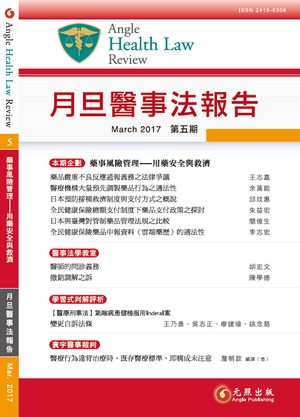日本與臺灣對管制藥品管理法規之比較【本期企劃】 試閱
The Comparison of the Controlled Drugs Management in Taiwan and Japan
全世界藥物濫用問題日益嚴重,主要濫用品目為成癮性麻醉藥品、影響精神藥品等,由於其具成癮性、濫用性,甚或產生社會危害,各國無不加強管理,但此類藥物對於疼痛控制、安眠等有良好之醫療效果,惟不當使用或流用、濫用可能產生如毒品之危害。臺灣在1998年5月20日公布毒品危害防制條例,管理非醫療使用之毒品,復依該條例第2條規定醫藥及科學需用之麻醉藥品與其製品及影響精神物質與其製品之管理,另以法律定之,而於1999年6月2日公布管制藥品管理條例,係此類藥品之非法使用以及合法醫藥與科學需用之管理規範,本文說明臺灣與相鄰之日本,其管理規範在法規上及制度上之異同。
Drug of abuse is a growing problem worldwide. Narcotic drugs, psychoactive substances are the major substances of abuse, because of the dependence tendency, potential for abuse and social harm, most countries have adopted strong management measures. However, some of these drugs have medical use for pain control and insomnia thus only in misuse and abuse can do harm. The “Narcotics Hazard Prevention Act” was promulgated on May, 20 1998 to manage drugs with no medical usage. According to the second article of the Narcotics Hazard Prevention Act, narcotics and its products, psychoactive substances and its products for medical and scientific purposes are regulated according to a separate law. On June 2, 1999, the “Controlled Drugs Act” was promulgated accordingly. This article compares the laws and regulations in the management of these drugs between Taiwan and Japan.
092-102






